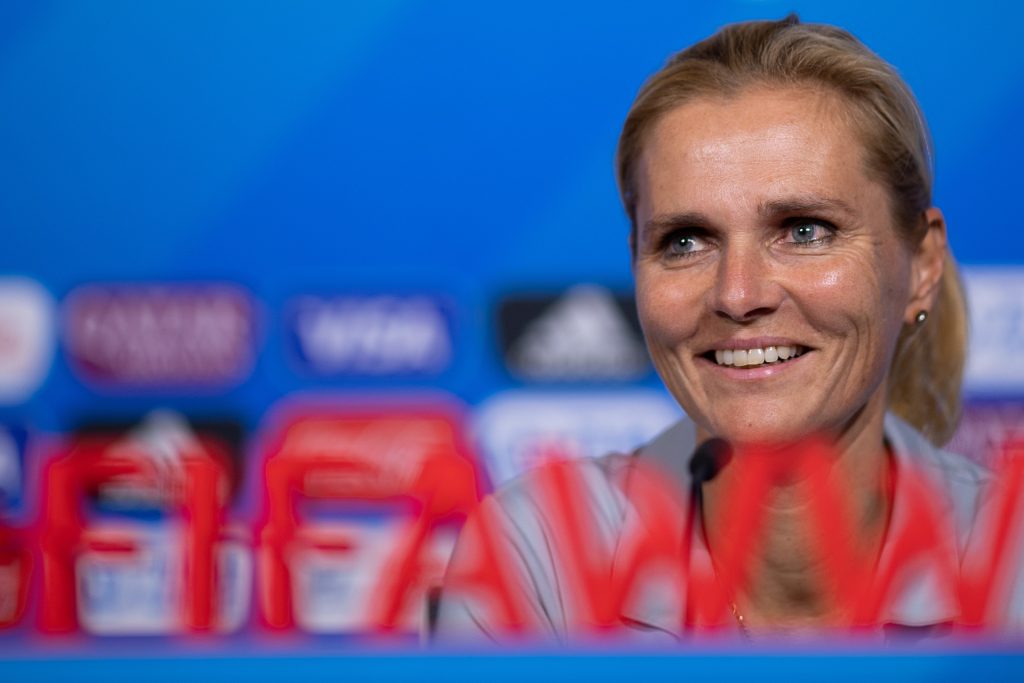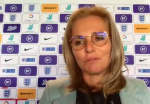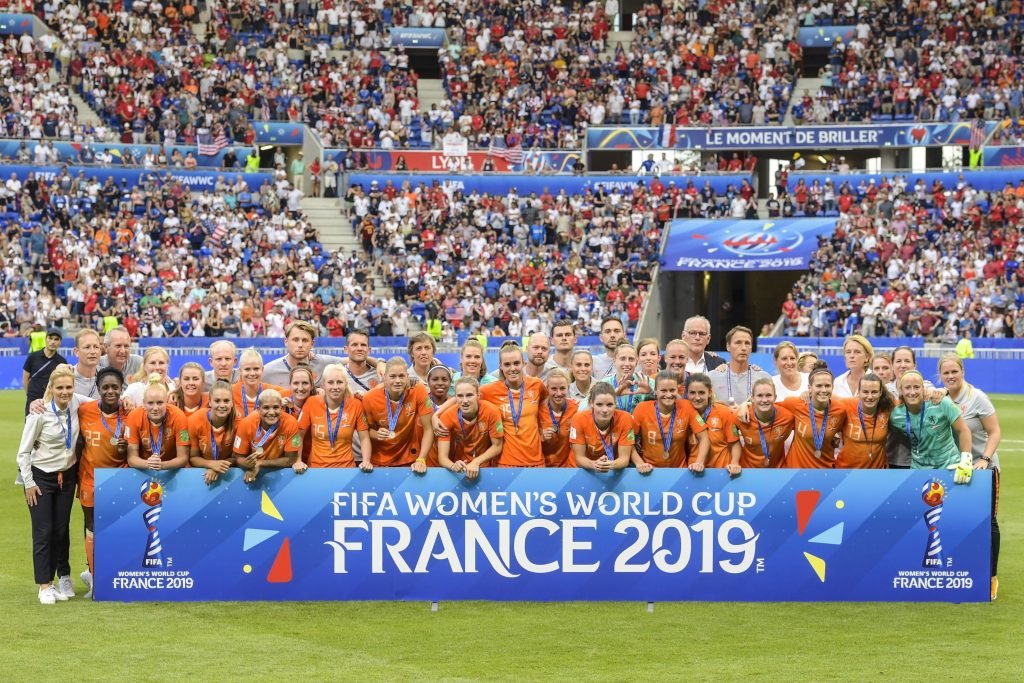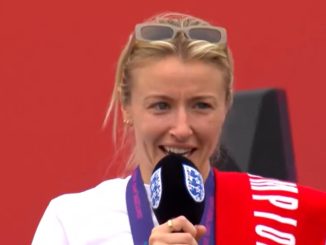
This afternoon members of the media were presented their first opportunity to speak to Sarina Wiegman since she was announced as the incoming England women’s head coach, writes SK’s Jen O’Neill.
 Over a virtual media conference that was efficiently arranged by The FA, with the courteous assistance of Wiegman’s current employers at the KNVB (Dutch Football Federation), Phil Neville’s replacement was impressively honest about her own ambition and excited to work with a ‘world-class’ set of players in England ‘the cradle of football’.
Over a virtual media conference that was efficiently arranged by The FA, with the courteous assistance of Wiegman’s current employers at the KNVB (Dutch Football Federation), Phil Neville’s replacement was impressively honest about her own ambition and excited to work with a ‘world-class’ set of players in England ‘the cradle of football’.
It was a slightly different type of conversation given that her focus is still so keenly set on guiding the Oranje Leuwinnen for the next 12 months and to their first Olympics, next summer. The nature of her position dictates that there was little chance of any earth-shattering utterances but for 40 minutes she talked openly and politely about her anticipation and expectations for the huge opportunity ahead. It was enjoyable viewing. Oh and when the type of questions came at her about whether this was one of the best or biggest jobs and perhaps hinting at her aspirations, positions like this [for a woman to be a professional coach with such resources, backing and competition], as she mentioned more than once, simply did not exist a decade ago. She didn’t set out on her career path with this as the ultimate, golden aim, so it would be disingenuous for her to claim so. But don’t doubt the passion to be challenged and to succeed, as you’re about to read.
Before they ‘released the hounds’ of the press (we were all nice, honest!) Sarina – speaking from ADO Den Haag (a club she both played for and managed and where her husband currently coaches too) – was introduced and welcomed by Baroness Sue Campbell and FA CEO Mark Bullingham.
It was palpably evident how pleased Sue Campbell is to have snared such a prized gem – “Clearly one of the best coaches in the world” – and one that has proven that she can stand ‘toe to toe’ against the world’s best, said Campbell, but also that it is the ‘person’ and not just the technical coaching talents, experience and success that drew them towards the ‘outstanding’ Wiegman as their perfect fit for the England role:
“She is a people person, a PE teacher, a coach and she is easy to talk to. She is very caring and in her interview she made it very clear she places great importance on building the right relationships with both her players and her support team and the people involved in the game.” For Sarina, emphasised Campbell, “people matter.”
In addition to that ability to build relationships came some other notable and potentially crucial qualities outlined by Campbell, given the unabashed ambitions of the hosts of Euro 2022:
“She is steely and a winner, she pays enormous attention to detail,” and she will provide honest feedback and be able to make the ‘tough decisions’.
They are very reassuring words and on the evidence of former players’ testimonies, our past experiences in press conferences and dealings with Wiegman and this convincing and impressive (yet understated) showing – the performances of her Dutch side in reaching the final at their last two major tournaments can speak for themselves – that evaluation seems to ring true.

Of course, enough waffle from us, you want to hear from the woman herself. So, here’s some snippets of what she had to say…
Sarina on taking the role:
“I’m very delighted and honoured that I’ll become the manager of the England team from 2021 and I’m going to do everything within my power to do the best I can do with the players and organisation and staff.”
On what attracted her to the role [and why she was happy to take it after speaking to Sue Campbell]:
“First of all, England is the cradle of football. They’ve done really well, there is great potential there. They have developed the game [and structure] very much and there is big organisation behind it. They have a professional league, so many talented players, great facilities and so it’s a real challenge for me to make the move. And I can finish with the Dutch, which is very important for me.
“Of course, I love the game. I have the nicest job you can think of and when you work with talented and ambitious people, I like that. When I spoke to Sue we were on the same level, the same page, very quickly.”

On leading a second host nation into a UEFA Women’s Euros:
“I went through that process with the national team of the Netherlands and I have that experience and so I hope we can use that experience. We have the time from September 2021 and we will need that time, with a quick start, with the staff and players. I have that experience of what it does in a country, the challenges you have but also the opportunities it gives. I’m looking forward to it.”
On the likely prospect of [yearly] back-to-back-to-back international tournament finals:
“That is the part of the job that makes it so exciting – playing tournaments. Most people don’t see what you do to get there. It’s a lot of effort, a lot of hard work and a lot of choices you have to make. For the players of course they work hard every day but it’s the same for the staff and when the tournaments starts it’s making the action and hopefully getting good results.”
On how she views England’s progress since the 3-0 loss to her Netherlands side in the semi-finals of Euro 2017:
“The women’s game world-wide is improving very much, so has England and so have other countries. I think the transition is that at the Euros they played more of the long ball and now they’re trying to play more of the possession game. That’s the biggest change I have seen from 2017 to now.”
On the style we might expect England to play when she takes over [will it be like the Dutch style]:
“First of all, England have been playing very well. They have a very strong team already and what I’d like to do is to add something, something the players believe in too. I follow every team but when I come in I have to first feel what the players think about some of the things that I’d like to add. There’s already good quality but it’s also about who do you play? I have a framework of how I’d like to play, I can add some things but I think England already has part of that framework. And then you take into account the opponent. Some are really strong and some are less strong, so we will see some different things.”
On the potential of the young talent in England:
The depth in the women’s game in England is great, there are so many good players and so many youngsters. I saw some in the U20 World Cup in 2018 and of course there are even younger players coming in. The structure, the competition and the pathway is very good.
On whether she will have any discussions with Phil Neville and how that relationship may work ahead of her taking the England role:
”Phil has the responsibility for the upcoming 12 months and I absolutely respect that. I’ll get some information in the background but the last thing I want to do is to interfere with his work. I will have a close look because I come in, in 2021, but now my responsibility and my main focus is the Dutch national team. Maybe in the future there will be a transition when we switch jobs and then there will be some discussion with Phil.
“I don’t want to interrupt him or be a pain for him. He just needs to do his job well, he is responsible. I’m not responsible yet – I’m responsible for the Dutch national team for the upcoming 12 months.”
And if she has spoken to the England team:
”I haven’t spoken to them [England players] yet and that wouldn’t be fair or polite just yet.”
On being ‘steely’ and speaking honestly to players – are the England team ready for that honesty:
“I didn’t know the word steely but I understand it. That’s my job. Sometimes you have a good message and sometimes you have a message the person really doesn’t like to hear, but it’s part of your job. So, the main thing is that you need to communicate and you need to explain things. You decide at what time you explain things, so they can get the context and work on it. They are competing for certain positions, so you have to be honest and have to give information and have to decide as part of your job and then you have to take care of the players and communicate with the players.”




